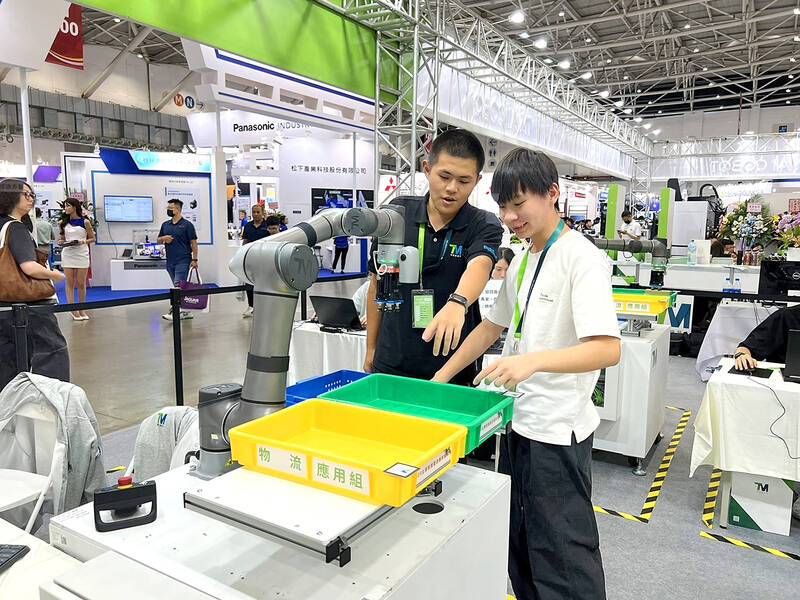Taiwan’s manufacturing output in the fourth quarter of last year rose 9.44 percent year-on-year to NT$5.05 trillion (US$154.21 billion), the highest in the past 10 quarters, the Ministry of Economic Affairs said in a report yesterday.
It was the fourth consecutive quarter of annual growth in manufacturing output, following increases of 10.47 percent in the third quarter, 14.31 percent in the second quarter and 4.76 percent in the first quarter, the report said.
The ministry attributed last quarter’s increase to continued production growth in the information technology and electronics industries, driven by robust demand for applications related to artificial intelligence (AI), high-performance computing (HPC) and cloud data services, coupled with stocking demand ahead of the Lunar New Year holiday, it said.

Photo: CNA
The production value of the electronic components industry — the manufacturing sector’s most important segment, with a 35.24 percent share of the total output — increased by an annual rate of 19.37 percent to NT$1.78 trillion, as a 26.81 percent rise in semiconductor output offset a 2.91 percent retreat in the production of flat panels and related components, it said.
The production value of computer and optical product suppliers, accounting for 8.87 percent of the manufacturing sector’s total output, soared 25.49 percent to NT$448.3 billion, the highest quarterly level ever, due to solid demand for AI devices and cloud-based servers, it said.
However, the uneven recovery in global end-market demand resulted in mixed output performance in traditional industries, where the reported production value of chemical material and fertilizer suppliers decreased 2.73 percent, while firms in the vehicle industry posted an 11.3 percent decline.
The output of base metal product makers increased 1.08 percent and producers of machinery equipment posted an 8.95 percent rise, the report said.
For the whole of last year, Taiwan’s manufacturing output increased 9.75 percent from a year earlier to NT$19.31 trillion, it added.
While the development of emerging applications related to AI and HPC, as well as the strong demand for advanced semiconductor chips and servers, are expected to continue supporting Taiwan’s manufacturing sector, a US-China technology rivalry, geopolitical conflicts and global trade protectionism pose uncertainties for the sector, the ministry said.

BYPASSING CHINA TARIFFS: In the first five months of this year, Foxconn sent US$4.4bn of iPhones to the US from India, compared with US$3.7bn in the whole of last year Nearly all the iPhones exported by Foxconn Technology Group (富士康科技集團) from India went to the US between March and last month, customs data showed, far above last year’s average of 50 percent and a clear sign of Apple Inc’s efforts to bypass high US tariffs imposed on China. The numbers, being reported by Reuters for the first time, show that Apple has realigned its India exports to almost exclusively serve the US market, when previously the devices were more widely distributed to nations including the Netherlands and the Czech Republic. During March to last month, Foxconn, known as Hon Hai Precision Industry

Taiwan Semiconductor Manufacturing Co (TSMC, 台積電) and the University of Tokyo (UTokyo) yesterday announced the launch of the TSMC-UTokyo Lab to promote advanced semiconductor research, education and talent development. The lab is TSMC’s first laboratory collaboration with a university outside Taiwan, the company said in a statement. The lab would leverage “the extensive knowledge, experience, and creativity” of both institutions, the company said. It is located in the Asano Section of UTokyo’s Hongo, Tokyo, campus and would be managed by UTokyo faculty, guided by directors from UTokyo and TSMC, the company said. TSMC began working with UTokyo in 2019, resulting in 21 research projects,

Ashton Hall’s morning routine involves dunking his head in iced Saratoga Spring Water. For the company that sells the bottled water — Hall’s brand of choice for drinking, brushing his teeth and submerging himself — that is fantastic news. “We’re so thankful to this incredible fitness influencer called Ashton Hall,” Saratoga owner Primo Brands Corp’s CEO Robbert Rietbroek said on an earnings call after Hall’s morning routine video went viral. “He really helped put our brand on the map.” Primo Brands, which was not affiliated with Hall when he made his video, is among the increasing number of companies benefiting from influencer

Quanta Computer Inc (廣達) chairman Barry Lam (林百里) yesterday expressed a downbeat view about the prospects of humanoid robots, given high manufacturing costs and a lack of target customers. Despite rising demand and high expectations for humanoid robots, high research-and-development costs and uncertain profitability remain major concerns, Lam told reporters following the company’s annual shareholders’ meeting in Taoyuan. “Since it seems a bit unworthy to use such high-cost robots to do household chores, I believe robots designed for specific purposes would be more valuable and present a better business opportunity,” Lam said Instead of investing in humanoid robots, Quanta has opted to invest